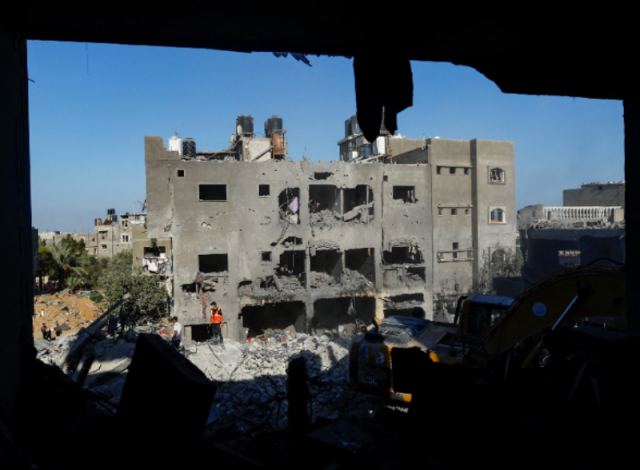
- “Civilians of Gaza City, evacuate south for your own safety…and distance yourself from Hamas terrorists who are using you as human shields,” the military said.
- U.N. says over 400,000 displaced in Gaza
- Israeli military said it struck 750 military targets in northern Gaza overnight
- Turkey and UAE hold talks on crisis
- Israel says Hamas hiding in Gaza City tunnels
JERUSALEM/NEW YORK/TEL AVIV — Israel‘s military on Friday called for all civilians of Gaza City, more than 1 million people, to relocate south within 24 hours, as it amassed tanks nearby ahead of an expected ground invasion after a devastating attack by the militant group Hamas.
“Now is a time for war,” Defence Minister Yoav Gallant said on Thursday as Israeli warplanes continued pounding Gaza in retaliation for the weekend attacks by Hamas militants that killed more than 1,300 Israelis, mostly civilians.
The Israeli military said it would operate “significantly” in Gaza City in the coming days and civilians should only return when advised. More than 1,500 Palestinians have already been killed in retaliatory attacks.
“Civilians of Gaza City, evacuate south for your own safety and the safety of your families and distance yourself from Hamas terrorists who are using you as human shields,” the military said.
“Hamas terrorists are hiding in Gaza City inside tunnels underneath houses and inside buildings populated with innocent Gazan civilians.”
A Hamas official said the Gaza relocation warning was “fake propaganda” and urged citizens not to fall for it.
The United Nations said it considered it impossible for such a movement of people to take place “without devastating humanitarian consequences.”
Israel‘s ambassador to the U.N., Gilad Erdan described the U.N.’s response to Israel‘s early warning to the residents of Gaza as “shameful”.
Israel has vowed to annihilate the Hamas militant group which led the attacks on Saturday.
The Israeli military said it struck 750 military targets in northern Gaza overnight, including what it said were Hamas tunnels, military compounds, residences of senior operatives and weapons storage warehouses.
A ground invasion of the narrow and densely populated Gaza Strip, home to 2.3 million people and under siege by Israel, poses serious risk, with Hamas holding scores of hostages kidnapped in the assault.
The U.N. humanitarian office (OCHA) said more than 400,000 people had fled their homes in Gaza and 23 aid workers had been killed since the start of Israeli retaliatory strikes in response to the deadly Hamas incursion.
The International Committee of the Red Cross (ICRC) said fuel powering emergency generators at hospitals in Gaza could run out within hours and the United Nations World Food Programme (WFP) warned food and fresh water were running dangerously low.
“The human misery caused by this escalation is abhorrent, and I implore the sides to reduce the suffering of civilians,” ICRC regional director Fabrizio Carboni said.
The United Nations Palestinian refugee agency (UNRWA) said it had moved its central operations centre and international staff to Gaza’s south and urged Israeli authorities to protect civilians in its shelters.
‘Riddled with bullets’
Seeking to build support for its response, Israel‘s government showed U.S. Secretary of State Antony Blinken and NATO defence ministers graphic images of children and civilians they said Hamas had killed in a weekend rampage in Israel.
Blinken said they showed a baby “riddled with bullets,” soldiers beheaded and young people burned in their cars. “It’s simply depravity in the worst imaginable way,” he said. “It’s really beyond anything that we can comprehend.”
Like others across the globe, Blinken urged Israel to show restraint, but he also reiterated America’s support, saying: “We will always be there by your side.”
On Friday he was due to meet Jordan’s King Abdullah and Mahmoud Abbas, head of the Palestinian Authority in the Israeli-occupied West Bank.
Blinken, seeking to stop spillover from the war, also planned to visit key allies Qatar, Saudi Arabia, Egypt and the United Arab Emirates – some with influence on Hamas, an Islamist group backed by Iran.
The foreign minister of Turkey, which has offered to mediate, held a call with his counterpart from the UAE, a Turkish foreign ministry source said, and will visit Egypt on Friday.
Turkey urged citizens in Lebanon to avoid the country’s south because of fighting between Israeli and Palestinian forces there.
The U.S. military is placing no conditions on its security assistance to Israel, U.S. Defense Secretary Lloyd Austin said, adding Washington expected Israel‘s military to “do the right things”. Austin was due to meet Israeli Prime Minister Benjamin Netanyahu in Israel on Friday.
Hamas called on Palestinians to rise up in protest at Israel‘s bombardment of the enclave, urging Palestinians to march to East Jerusalem’s Al-Aqsa Mosque and clash with Israeli troops in the occupied West Bank.
Safety concerns prompt security measures
The United States and Japan were among countries offering charter flights for their citizens wanting to leave Israel.
Police in Paris used tear gas and water cannon to break up a a banned rally in support of the Palestinians.
Some Jewish schools in Amsterdam and London were set to close temporarily due to safety concerns and police in New York and Los Angeles stepped up their presence around synagogues and Jewish community centers.
The Arab American Anti-Discrimination Committee, an Arab advocacy group, said on Thursday that FBI agents had visited mosques and U.S. residents with Palestinian roots, calling it a “troubling trend.”
In Jerusalem, scores of Israelis gathered at the Mount Herzl military cemetery to bury their dead.
“I could not imagine this is how it would end,” one mourner said.
In Gaza’s main southern city Khan Younis, dead were being buried in empty lots, like the Samour family, killed on Wednesday night in a strike that hit their house.
“This war is harsh beyond imagining,” said Ibrahim Hamdan, who has worked through repeated wars since becoming a rescuer in 2007.
Gazans, mainly descendants of refugees who fled or were expelled from homes in Israel at its founding in 1948, have suffered economic collapse and repeated Israeli bombardment under a blockade since Hamas seized power there 16 years ago.
A peace process meant to create a Palestinian state collapsed a decade ago and Israel‘s right-wing government has cracked down in the West Bank and talked of seizing more land. Palestinian leaders say this left the population with no hope, strengthening extremists.
– Reporting by Henriette Chacar, Dedi Hayun, Maayan Lubell and Emily Rose in Jerusalem, Michelle Nichols in New York, Emma Farge in Geneva, Jeff Mason in Washington, Humeyra Pamuk in Tel Aviv, Steve Gorman and Dan Whitcomb in Los Angeles and Emma Farge in Geneva; Writing by Michael Martina and Michael Perry; Editing by Howard Goller, Diane Craft, Lincoln Feast, Philippa Fletcher









